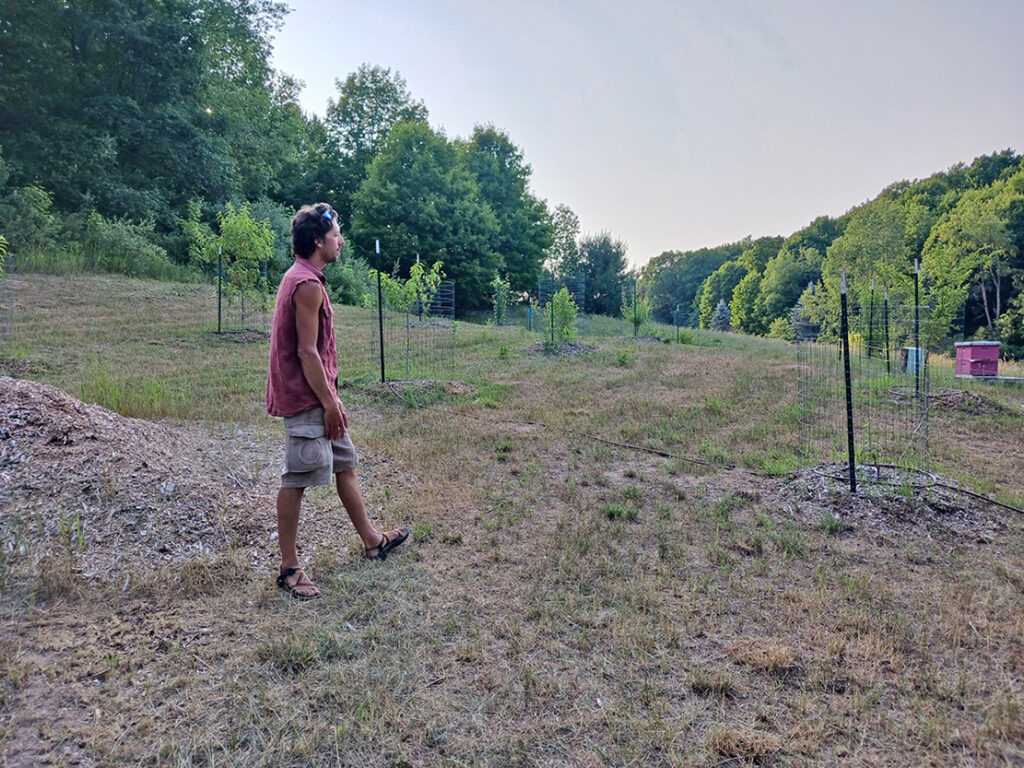A Visit to Laughing Linden Farm
Oryana and Crosshatch Center for Art & Ecology are frequent partners in various community endeavors, including our annual community grant program, which Crosshatch organizes. Crosshatch offers informative events throughout the year at local farmsteads and agricultural businesses, and we recently attended the tour ‘Resilient Bounty: Conservation and Diversification for Ecological and Economic Abundance.’ This was a tour of a beautiful property in Benzie County with hosts Eran and Stephanie Rhodzell of Laughing Linden Farm, whose goal is to transform the property into a food forest and community gathering space.
Both Eran and Stephanie studied in disciplines that prepared them for their farm endeavor. Both have degrees in sustainable agriculture and Eran worked on organic farms around the country. Stephanie is certified in permaculture design and trained in herbal medicine.




Eran served as our guide, and as we strolled around production areas of the 68 acre rolling, wooded property, it was apparent that this land was thoughtfully and lovingly cultivated in a way that incorporated much of the existing plant life while welcoming new, native plantings that are already blending in naturally, although the farm is only 7 years old. We toured through the different farm areas and features that included a berry patch, medicinal herb garden, vegetable garden, seedling hoophouse, greenhouse, fruit orchard, and nut tree forest.
The nut tree forest – 400 trees entirely hand-planted by Eran and a few friends – was the result of a grant obtained from the USDA Natural Resources Conservation Service (NRCS) in their Environmental Quality Incentives Program. The couple used the funds to obtain native nut trees including White Oak, Hazelnut, American Plum, and Serviceberry, among others, for reforestation and the restoration of native plant communities. This summer has been unusually dry, and the drought conditions have made it a challenge to keep the young trees watered. It takes Eran 4 hours to water them all by hand.


We enjoyed grazing on black raspberries and sweet currants that were growing in abundance while appreciating the sheer diversity of plant life that is thriving on the farm, in spite of the dry conditions. The berry patch, featuring young blueberry, raspberry, currant, thornless blackberry, and saskatoon bushes, will one day offer you-pick opportunities. The terraced herb garden was full of medicinal plants for home and future commercial use. There was a 3-sisters garden, a technique that follows the Native American tradition of planting corn, beans, and squash together to allow all three vegetables to benefit from their proximity to each another.
Some garden areas were interspersed with irrigation hoses, a much welcomed hands-off method for keeping plants watered. Chickens, ducks, and turkeys clucked and scratched in a large enclosure with plenty of green grass to forage. Eran said he hopes they will have larger ruminant animals some day. In fact, the family has big plans for the future that will eventually yield a full income, from you-pick berries, workshops and music performances, to wholesale nuts & fruits, spiritual gatherings, a plant nursery, and more. As stated on their website, the plan is to turn the farm into a fully functioning poly-cultural, multi-use, food-forest, and sanctuary. Until then, Eran runs a landscaping business while Stephanie takes care of their two children and tends the medicinal plant garden for a small herbal business.


Eran is not afraid to experiment and showed us a thick patch of hemp plants obscuring some garlic plants. There are no specific plans for the hemp but it is a beautiful addition to the landscape. Volunteer plants and trees are welcomed into the fold, and quite a few trees had been started from seed. Eran is also a big fan of no-till, sheet mulching as a preparation method for garden beds. Sheet mulching entails mowing any existing grass, laying down overlapping layers of cardboard, and covering this with a thick layer of woodchips. In just a short while the cardboard breaks down and starts feeding the soil and eventually the wood chips also break down, creating a perfect blank canvas for a garden bed.


A brand new outdoor brick pizza oven looked to be almost complete, foretelling some delicious offerings perhaps in the near future. Pollinator-friendly plants were in abundance everywhere, and Eran pointed out a natural bee colony living in the wall of the barn. They also care for a burgeoning apiary of bee hives, which is part of their land being a ‘Pollinator Sanctuary’ in connection with the non-profit Save the Honeybee Foundation (www.honeybeesancuary.org). He rattled off too many trees and plants to list, but some of the ones we took note of included honeyberry, motherwort, serviceberry, greek mullein, linden, and many more.
This farm is a poster child of what can be accomplished with a wild, overgrown property in northern Michigan. With a bold vision and hard work, Laughing Linden Farm serves as a living example of what you can do when working with a piece of land in concert with nature to transform it to a healthy ecosystem for wildlife and pollinators and source of sustainably-grown abundant food to support a family and the whole community. Be on the look out for future events hosted by the farm, in beautiful southwestern Benzie County.
